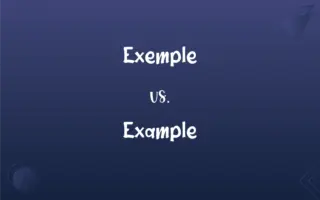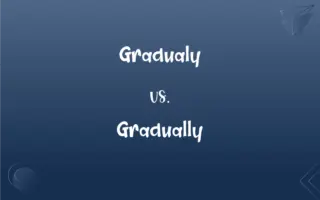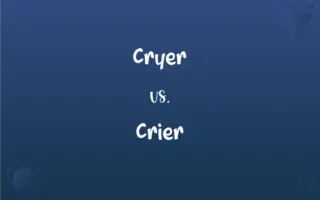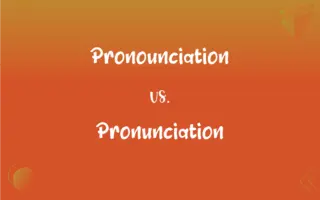Caffein vs. Caffeine: Mastering the Correct Spelling
Edited by Janet White || By Harlon Moss || Updated on March 9, 2024
"Caffein" is a common misspelling; the correct spelling is "caffeine," a stimulant found in coffee and tea.

Which is correct: Caffein or Caffeine
How to spell Caffeine?

Caffein is Incorrect

Caffeine is Correct
ADVERTISEMENT
Key Differences
Associate caffeine with the "ine" in "medicine," since caffeine affects the body.
Think of the "ine" at the end of "caffeine" as part of "routine," something caffeine is for many people.
The word "caffeine" ends in "-ine" like other alkaloids and chemicals.
Remember "caffeine" has the same number of 'e's as in "coffee," which it's found in.
Recall that "caffeine" contains "cafe," a place where you might consume it.
ADVERTISEMENT
Correct usage of Caffeine
I need my morning cup of caffein to get started.
I need my morning cup of caffeine to get started.
Too much caffein can make you feel jittery.
Too much caffeine can make you feel jittery.
Does green tea have less caffein than coffee?
Does green tea have less caffeine than coffee?
This medication contains caffein as an active ingredient.
This medication contains caffeine as an active ingredient.
She avoids caffein in the evening to sleep better.
She avoids caffeine in the evening to sleep better.
Caffeine Definitions
Medically, caffeine is used to restore mental alertness or wakefulness.
He took a caffeine tablet to combat his drowsiness.
Socially, caffeine is often a focal point for social gatherings.
Friends met regularly for their caffeine fix at the local café.
In plants, caffeine serves as a natural pesticide.
The caffeine in the plant leaves deterred pests.
Caffeine is a bitter compound present in coffee, acting as a stimulant.
The caffeine in her morning coffee helped her wake up.
In chemistry, caffeine is classified as an alkaloid and psychoactive drug.
Caffeine's molecular structure is C8H10N4O2.
A bitter white alkaloid, C8H10N4O2, found in certain plants such as cacao, coffee, kola, and tea, that stimulates the central nervous system and body metabolism and is used in medicine, usually in combination with other drugs, to relieve headaches and treat respiratory conditions in premature infants.
An alkaloid, C8H10N4O2, found naturally in tea and coffee plants which acts as a mild stimulant on the central nervous system.
A bitter alkaloid found in coffee and tea that is responsible for their stimulating effects
Caffeine Sentences
Caffeine is found naturally in tea leaves and coffee beans.
Caffeine helps me stay awake during long meetings.
Excessive caffeine intake can lead to health problems.
Energy drinks often have high levels of caffeine.
Caffeine withdrawal can cause headaches and irritability.
I prefer decaffeinated coffee because I'm sensitive to caffeine.
Caffeine can temporarily boost your concentration and alertness.
Some pain relievers contain caffeine to enhance their effectiveness.
Pregnant women are advised to limit their caffeine consumption.
Many people are surprised by the amount of caffeine in chocolate.
He cut down on caffeine and noticed an improvement in his sleep quality.
Some people metabolize caffeine faster than others.
Did you know that some toothaches medicines contain caffeine?
Many athletes use caffeine as a legal performance enhancer.
The caffeine in soda can also contribute to your daily intake.
Your morning cup of coffee provides more than just caffeine.
Caffeine tolerance can build up over time, requiring more to feel its effects.
Caffeine can increase your heart rate and blood pressure.
It's important to hydrate since caffeine can dehydrate you.
The debate on caffeine's health benefits is ongoing.
She uses caffeine to help her through her night shifts.
Switching to caffeine-free beverages in the evening can help improve sleep.
There are caffeine-free alternatives for most caffeinated beverages.
The caffeine content in tea can vary widely.
Some skin care products contain caffeine for its tightening effect.
Caffeine Idioms & Phrases
Caffeine fix
The act of satisfying one’s need for caffeine.
Let's stop by the café for a quick caffeine fix.
Caffeine buzz
The energized feeling one gets after consuming caffeine.
I got a strong caffeine buzz from that espresso.
Running on caffeine
Depending heavily on caffeine to maintain energy throughout the day.
I'm totally running on caffeine during finals week.
A shot of caffeine
A quick way to describe getting a dose of caffeine, usually through coffee or an energy drink.
I need a shot of caffeine before we start the meeting.
Kick the caffeine habit
To stop or reduce the consumption of caffeine.
She's trying to kick the caffeine habit to improve her sleep.
Caffeine jitters
The nervous or shaky feeling from too much caffeine.
I have the caffeine jitters after drinking three cups of coffee.
Caffeine-free zone
A place or time when/where no caffeine is consumed.
Our house becomes a caffeine-free zone after 6 PM.
Caffeine tolerance
The body’s reduced response to caffeine over time, requiring more to feel the same effects.
My caffeine tolerance is so high, one cup of coffee does nothing.
Caffeine crash
The sudden drop in energy levels after the effects of caffeine wear off.
I hit a caffeine crash by mid-afternoon.
Caffeine withdrawal
The negative symptoms experienced when a regular caffeine consumer stops intake suddenly.
Headaches are a common sign of caffeine withdrawal.
Cut back on caffeine
To reduce the amount of caffeine consumed.
My doctor suggested I cut back on caffeine for my health.
Eyes wide from caffeine
Being wide-awake or alert due to caffeine consumption.
I was eyes wide from caffeine all night.
Caffeine cycle
The routine of consuming caffeine regularly, experiencing a boost, and then crashing.
I'm trying to break out of my caffeine cycle.
On a caffeine break
Taking a pause to consume caffeine, usually in the context of work or study.
Let's go on a caffeine break before we tackle the next project.
Fuel up on caffeine
To consume caffeine to gain energy.
I need to fuel up on caffeine before starting my day.
Caffeine fiend
Someone who is very enthusiastic about or addicted to caffeine.
I'm a caffeine fiend; I can't start my day without coffee.
Caffeine habit
The regular consumption of caffeine as part of one's daily routine.
My morning caffeine habit helps me start the day on the right foot.
Caffeine overload
Consuming too much caffeine, leading to negative side effects.
I think I'm on a caffeine overload; I feel really anxious.
FAQs
What is the verb form of caffeine?
Caffeine does not have a verb form; it is a noun.
What is the pronunciation of caffeine?
Caffeine is pronounced as /ˈkæf.iːn/.
Why is it called caffeine?
The name "caffeine" comes from the German word "kaffein," a compound of "kaffee" (coffee) and "ine," a chemical suffix.
What is the root word of caffeine?
The root word of caffeine is "café," from the French term for coffee.
What is the singular form of caffeine?
The singular form is "caffeine."
Which vowel is used before caffeine?
The vowel "e" is used before the final "ine" in caffeine.
Is caffeine an adverb?
No, caffeine is not an adverb.
Is caffeine a negative or positive word?
Caffeine is neutral; its connotation depends on the context.
Which article is used with caffeine?
The indefinite article "a" or definite article "the" can be used with caffeine.
What is the plural form of caffeine?
Caffeine does not have a plural form; it is an uncountable noun.
Which preposition is used with caffeine?
Prepositions such as "in" and "with" are commonly used with caffeine.
Which conjunction is used with caffeine?
Conjunctions used with caffeine can include "and," "or," and "but," depending on the context.
What is a stressed syllable in caffeine?
The first syllable "caf" is stressed in caffeine.
How is caffeine used in a sentence?
"Many people consume caffeine every day in coffee or tea."
Is caffeine a vowel or consonant?
The word "caffeine" contains both vowels and consonants.
Is caffeine a collective noun?
No, caffeine is not a collective noun.
How many syllables are in caffeine?
There are three syllables in caffeine.
How do we divide caffeine into syllables?
Caffeine is divided as caf-fe-ine.
What is the first form of caffeine?
Caffeine is a noun and does not have different forms.
Is caffeine a noun or adjective?
Caffeine is a noun.
Is caffeine an abstract noun?
No, caffeine is a concrete noun; it refers to a substance.
What part of speech is caffeine?
Caffeine is a noun.
What is the third form of caffeine?
There is no third form of caffeine.
Is the caffeine term a metaphor?
The term "caffeine" itself is not a metaphor, but it can be used metaphorically.
Is the word caffeine imperative?
No, caffeine is a noun and cannot be imperative.
What is another term for caffeine?
A scientific term for caffeine is 1,3,7-Trimethylxanthine.
Is caffeine a countable noun?
No, caffeine is an uncountable noun.
What is the opposite of caffeine?
There is no direct opposite, but a sedative or a sleep-inducing agent could be considered functionally opposite.
Which determiner is used with caffeine?
Determiners such as "some," "much," "little," and "no" can be used with caffeine.
What is the second form of caffeine?
There is no second form of caffeine, as it is not a verb.
About Author
Written by
Harlon MossHarlon is a seasoned quality moderator and accomplished content writer for Difference Wiki. An alumnus of the prestigious University of California, he earned his degree in Computer Science. Leveraging his academic background, Harlon brings a meticulous and informed perspective to his work, ensuring content accuracy and excellence.
Edited by
Janet WhiteJanet White has been an esteemed writer and blogger for Difference Wiki. Holding a Master's degree in Science and Medical Journalism from the prestigious Boston University, she has consistently demonstrated her expertise and passion for her field. When she's not immersed in her work, Janet relishes her time exercising, delving into a good book, and cherishing moments with friends and family.


































































